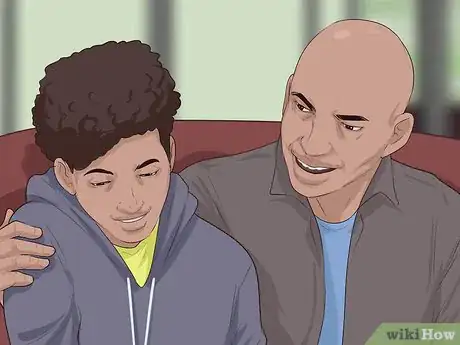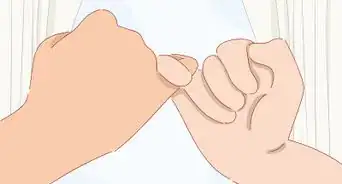This article was co-authored by Tasha Rube, LMSW. Tasha Rube is a Licensed Social Worker based in Kansas City, Kansas. Tasha is affiliated with the Dwight D. Eisenhower VA Medical Center in Leavenworth, Kansas. She received her Masters of Social Work (MSW) from the University of Missouri in 2014.
This article has been viewed 17,555 times.
A long-lost sibling’s refusal to meet with you can be an extremely painful experience. In order to cope with the rejection, you will need to let yourself grieve and try not to take it personally. It is also important that you process your emotions by writing about them, joining a support group, or seeking professional help. Finally, you will need to manage your relationship with your sibling by giving them some space and knowing when to let them go.
Steps
Dealing with Rejection
-
1Let yourself grieve. Being rejected by a sibling is a particularly painful experience. You likely envisioned that your long-lost sibling would be excited to meet you and that you would develop a loving relationship. Because of this, their refusal to meet with you hurts deeply. Along with disappointment, you will likely feel other emotions like sadness and anger. It is important that you allow yourself to express these emotions and take some time to grieve.[1]
- For example, it is important that you take the time to cry and express your sorrow over your sibling's rejection. If you need to, take time off from work in order to express and process your emotions.
- For some people, rejection might cause or exacerbate conditions such as depression or anxiety. Do not feel afraid to reach out to other loved ones, friends, or a mental health professional for help during this time.
-
2Try not to take it personally. The first assumption that many people make when facing rejection is that it is their fault. You will likely feel that your long-lost sibling’s refusal to meet with you is somehow your fault. However, it is important to remember that meeting a long-lost relative, particularly a sibling, will be emotionally difficult for everyone involved. Keep in mind that your sibling is not necessarily rejecting you. They are more likely having a difficult time with the idea that they have a long-lost sibling.[2]
- Depending on the circumstances of your separation, there may be other factors that are preventing your long-lost sibling from connecting with you.
Advertisement -
3Practice acceptance. Unlike other aspects of our lives, there is little that we as individuals can do to change the feelings and emotions of others. If your sibling does not want to meet with you, there is little that you can do about that. Therefore, it is important that you learn to accept and come to peace with your sibling’s decision.[3]
- This is not something that you will come to overnight. It will take time and a lot of work before you are able to come to peace with your sibling’s refusal.
Processing Your Emotions
-
1Focus your attention on other tasks. Although distracting yourself from your emotions is not the best option, it can help you feel better momentarily. Things like exercising, gaming, or working on a hobby may take your mind off your sibling’s rejection and the associated feelings. However, the only healthy way to deal with your emotions is by addressing them.[4]
- Exercise can significantly improve your mood and help you fight off depression.[5]
-
2Write about your feelings. One of the first steps that you can take when dealing with negative emotions is to write them down. Write about your how you feel in a journal or a diary. Share how your sibling's rejection made you feel and what that means for your relationship with them. Putting your feelings on paper can help you better process things.[6]
- You might consider writing a letter to your long-lost sibling that expresses how you feel. However, if you feel like sending the letter, think about it for at least a week before mailing it.
-
3Talk to a friend or family member. When dealing with your sibling’s rejection, turn to your friends and family for support. Talk with them about how you feel. A good friend will listen to you and help you better understand the situation.[7]
- Talking with shared family members of the long-lost sibling may be more complicated, especially if they have a relationship with the sibling. Feel out these situations and determine who will be a good confidant.
- When discussing your feelings with family or friends, avoid blaming yourself. Try not to dwell on negative thoughts about yourself or the sibling who rejected you. Use facts to understand the rejection. Allow time for positive talk during these sessions, as such positive interactions will give you natural emotional pain relief.
-
4Join a support group. Talking with other people who have experienced a similar type of rejection may help you make sense of your sibling’s rejection. Look for organizations and groups in your area that bring together people who have been shunned or rejected by their family members. You can also go online and join a chat group for people who are in situations similar to yours.[8]
- Joining a support group will allow you to share your feelings with people who can relate to your situation and help you feel less alone. Expressing your feelings to both yourself and others can help clarify the event. It may help give you a deeper understanding of why your sibling did not want to meet.
-
5Seek professional help. If you are struggling with the rejection, a counselor or therapist may be able to help you process your emotions. They will talk with you about the rejection and any associated feelings. After meeting with a mental health professional for a few sessions, you may have new insights into the rejection that help you feel better about the situation.[9]
- Go online to find mental health professionals in your area. Make sure that they are certified through your state’s psychological board.
Managing the Relationship
-
1Talk to your long-lost sibling. If you are still in communication with the long-lost sibling, you should ask them about why they refused to meet with you. Getting a full picture of why they refused to meet with you will help you emotionally process things and decide what to do next. It is important that you address any extenuating circumstances that might prevent them from wanting to meet with you.
- Although a phone call would be ideal for this conversation, you should utilize whatever mode of communication feels the most comfortable.
- You might ask them things like “Why won’t you meet with me?” or “What is getting in the way of us meeting in person?”
-
2Give the sibling space. It is important that you give the sibling the distance that they ask for. Continuing to contact your long-lost sibling after they have refused to meet you will likely only strengthen their desire to avoid you. If your sibling asks you to back off, you should honor their request and give them some space.[10]
-
3Offer your support. If you are interested in leaving open the option of reconnecting in the future, you might offer your sibling your continued emotional support. Although your sibling has expressed their desire not to meet with you, let them know that you are still there for them. Express to them that, if they need anything or want to reconnect in the future, that you would be available.[11]
- You might say something like “I love you and I’ll be here if you need me” or “If you ever want to talk, you can call me.”
- However, try to set healthy boundaries. For example, avoid financially supporting a long-lost sibling who refuses to meet with you in person. You do not want to enter into a situation where someone is exploiting you for your resources.
-
4Know when to quit. If your long-lost sibling shows no indication of wanting you in their life, you should know when to walk away. It can be extremely difficult to end a relationship, particularly with a family member. However, distancing yourself from a painful relationship, in the end, may help you feel better. If your long-lost sibling absolutely refuses to have a relationship with you, it is important that you know when to step back.[12]
- You might say something like “I can’t handle your rejection anymore” or “It hurts me too much to not be close to you.”
References
- ↑ http://www.professional-counselling.com/how-to-deal-with-rejection.html
- ↑ https://www.psychologytoday.com/blog/the-attraction-doctor/201107/dealing-rejection-part-1-handling-others-rejecting-behavior
- ↑ http://tinybuddha.com/blog/dealing-with-disappointing-relationships-change-your-expectations/
- ↑ http://standalone.org.uk/guides/adultchildren/
- ↑ http://www.health.harvard.edu/mind-and-mood/exercise-and-depression-report-excerpt
- ↑ http://standalone.org.uk/guides/adultchildren/
- ↑ http://standalone.org.uk/guides/adultchildren/
- ↑ http://standalone.org.uk/guides/adultchildren/
- ↑ http://standalone.org.uk/guides/adultchildren/
- ↑ https://www.psychologytoday.com/blog/the-attraction-doctor/201107/dealing-rejection-part-1-handling-others-rejecting-behavior
- ↑ http://tinybuddha.com/blog/dealing-with-disappointing-relationships-change-your-expectations/
- ↑ https://www.psychologytoday.com/blog/pieces-mind/201502/deciding-leave-relationship





































































